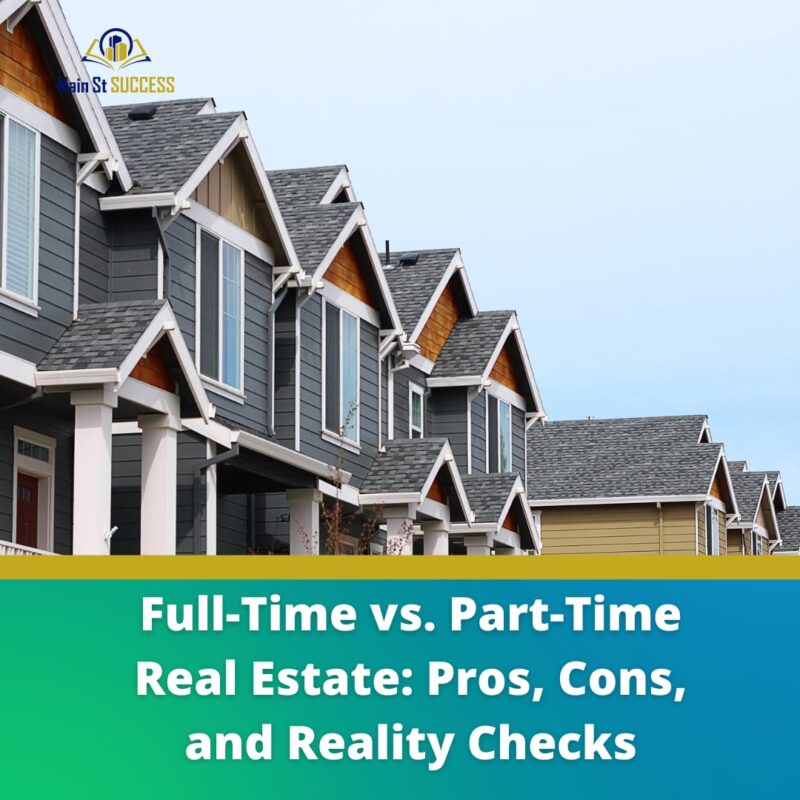Blog
Full-Time vs. Part-Time Real Estate: Pros, Cons, and Reality Checks
Working in real estate offers a level of flexibility and autonomy that’s hard to find in many other careers. Whether you’re drawn by the promise of helping people find their dream home or intrigued by the income potential, one of the first big decisions is whether to pursue it full-time or part-time. This choice shapes not only your schedule but also your trajectory in the industry. Here’s a grounded look at what each path involves, the trade-offs, and what to really expect.
Full-Time Real Estate: All In, All the Time
Choosing to work full-time in real estate usually means treating it like running your own small business. You’re setting your own hours, but in practice, that often means being available when clients need you, including evenings and weekends. You’ll likely spend your days juggling showings, client meetings, paperwork, and lead generation. It’s a hustle.
The biggest advantage of going full-time is momentum. With more hours dedicated to learning, networking, and closing deals, agents tend to ramp up their careers more quickly. It becomes easier to build a pipeline of clients and referrals when real estate is your main focus.
But full-time real estate also comes with pressure. There’s no guaranteed paycheck. If you don’t sell, you don’t get paid. That’s a tough reality, especially in slower markets. Success depends not just on effort, but also on resilience and a solid strategy for staying visible and valuable to clients.
Part-Time Real Estate: Flexibility with Limits
Working part-time appeals to people who have other commitments, such as a day job, family responsibilities, or a cautious approach to jumping into a commission-based career. It offers a way to learn the ropes, earn supplemental income, or test the waters without the financial strain of going all in.
Part-time agents can succeed, especially if they’re organized and honest with their clients about availability. Technology has made it easier than ever to stay connected, schedule showings, and manage transactions even with limited hours.
However, time constraints are a real challenge. Clients expect responsiveness, and competition can be fierce. Many successful agents started part-time, but most eventually faced a crossroads: scale up or stay small. Without enough time to nurture leads and follow up consistently, it’s easy for business to plateau.
Reality Checks: What the Industry Doesn’t Always Say
Regardless of whether you’re full-time or part-time, real estate demands more than charm and a license. There’s a steep learning curve. Contracts, negotiations, local laws, marketing, and financing all play a part in a deal. If you’re not keeping up, you risk doing a disservice to your clients.
There’s also the emotional aspect. Deals fall through. Clients ghost. Markets shift. You’ll need a thick skin and the ability to bounce back from setbacks. Mentorship helps. So does finding a brokerage that supports your growth rather than just adding you to a roster.
And let’s talk money. Many new agents underestimate the upfront costs: licensing, association fees, marketing expenses, continuing education. Without steady closings, those add up fast. Part-time agents may feel this more acutely, especially if deals are infrequent.
What’s the Better Choice?
It really depends on your situation. Full-time is ideal if you have the savings to weather slow periods and the time to build a client base. It offers the most potential for long-term success, but also the most risk early on. Part-time can be smart if you’re exploring the field or need to maintain another source of income. Just be clear-eyed about your availability and how that affects your ability to compete.
Some agents start part-time and go full-time once their pipeline can support it. Others stay part-time and focus on a niche or a steady but modest volume. There’s no single path that works for everyone.
The key is honest self-assessment. What can you realistically commit to? How much runway do you have financially? Are you ready to build a business, not just sell houses?
Real estate can be incredibly rewarding, but success usually comes down to consistency, discipline, and staying engaged over the long haul. Whether you jump in full-time or start small, what matters most is treating it like a serious professional pursuit from day one.

